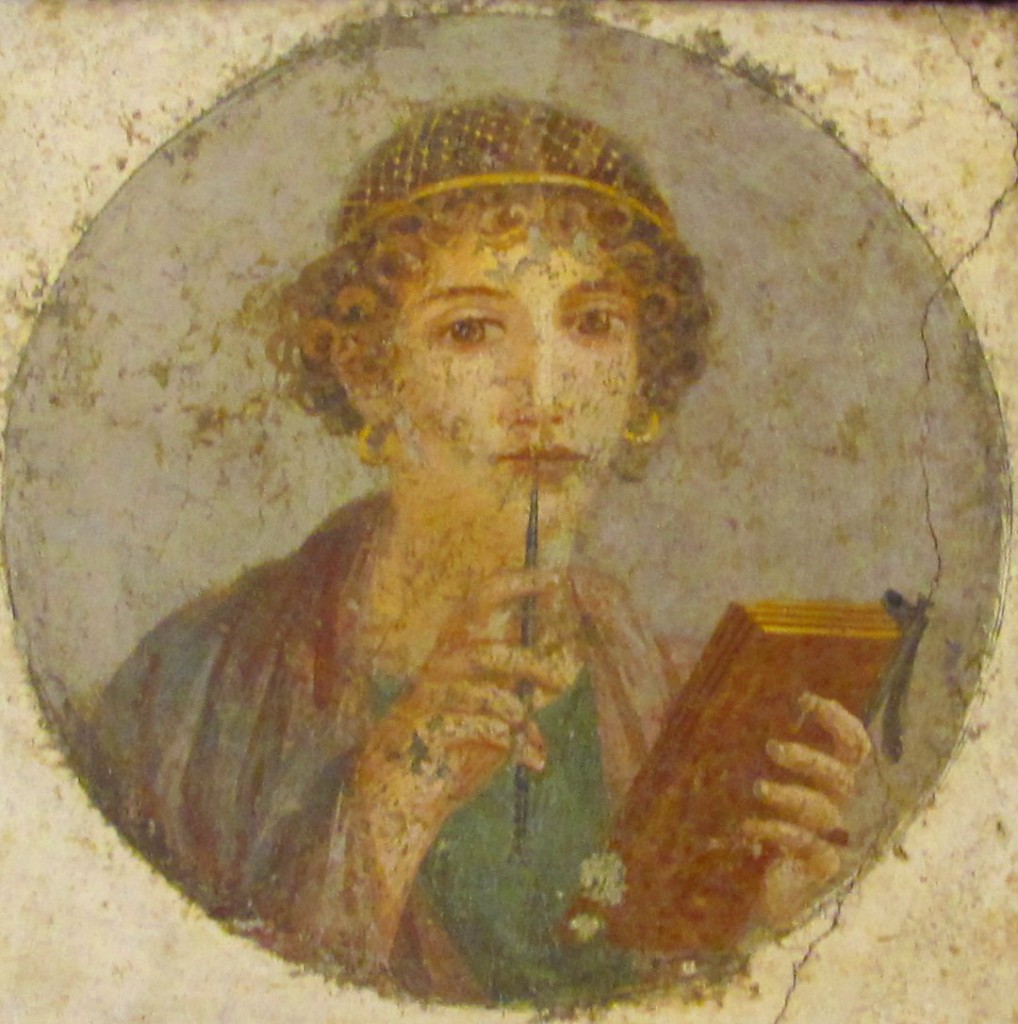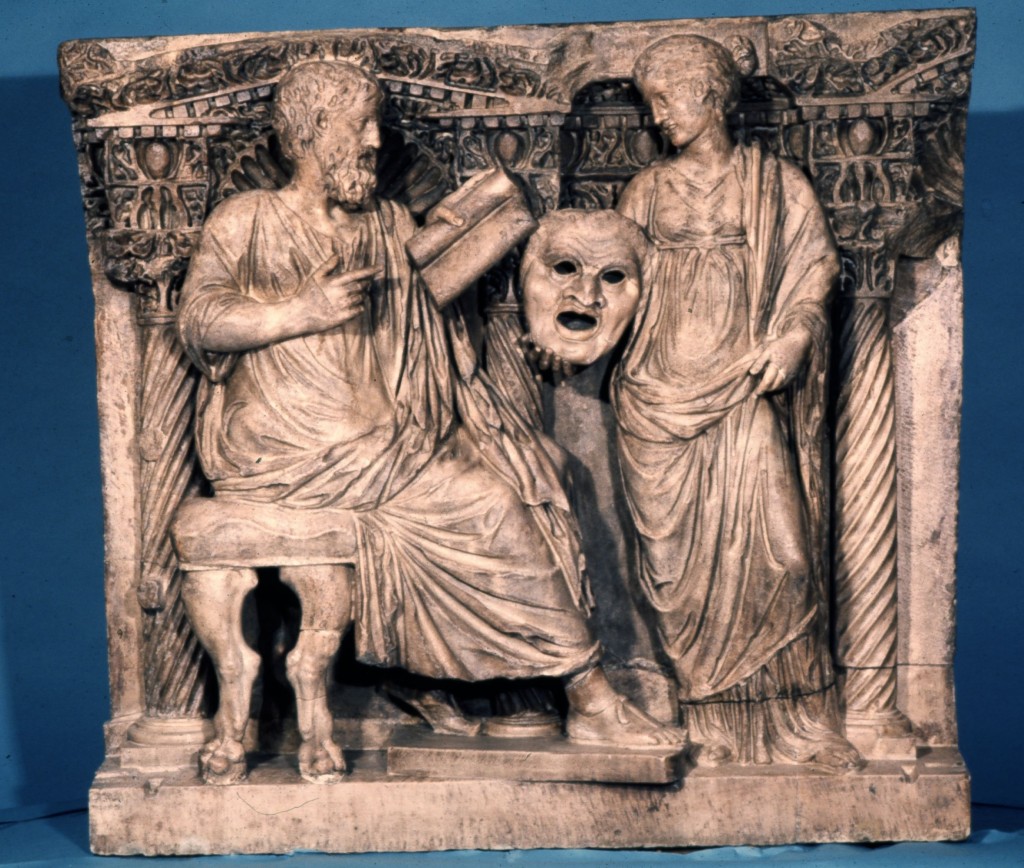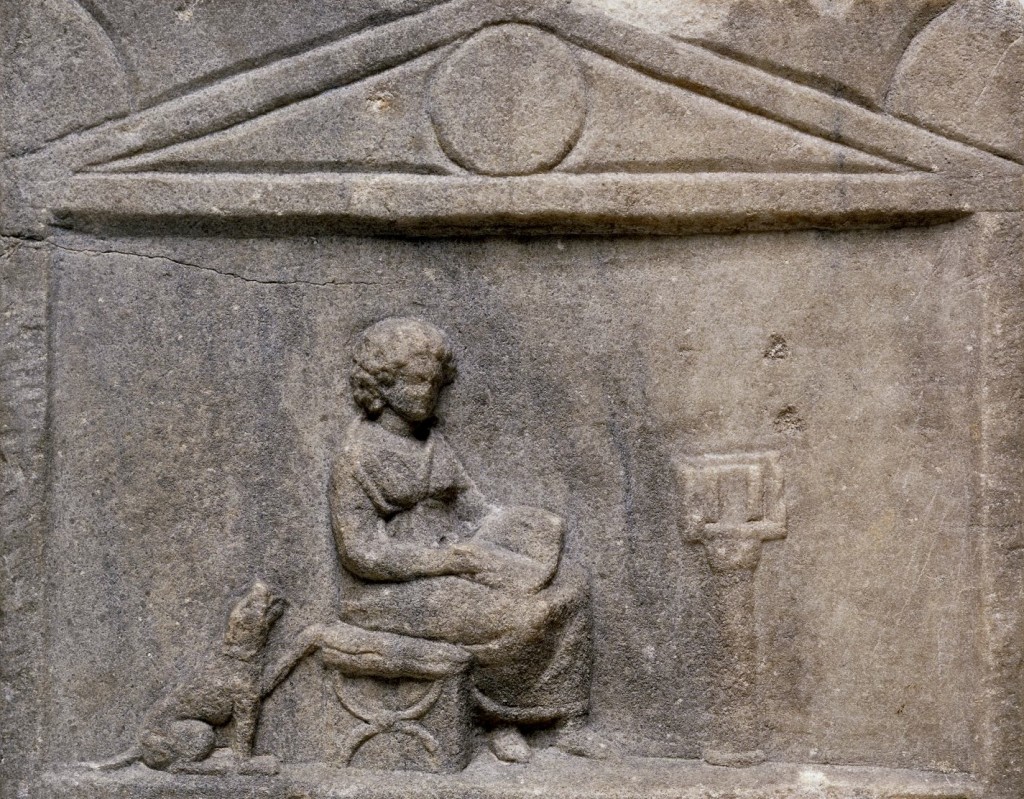
Money-making booksellers, exploited and impoverished authors, celebrity book launches and the danger of writing controversially. Sound familiar?
Although without the current technology of print-on-demand, digital publishing, even the lithographic or moveable type of not so long ago, the Roman world had a thriving publishing industry. Production was by teams of slaves who copied original manuscripts which were then sold in shops. Copyright didn’t exist, so publishers didn’t have to pay authors for their work.
The only way writers could make a good living out of their work was to be sponsored by a wealthy Roman. i.e. to become the ‘client’ of an influential ‘patron’. The writer could produce his own work, but he was under a strong obligation to write what the patron wanted. He would also be trotted out to give readings of his work to the patron’s friends at parties. However, it was an opportunity for the writer to launch his latest work in front of other potential patrons, to network and possibly find a new, better sponsor.

However, woe betide (thrice woe!) if the author wrote something that displeased his patron. Apart from losing his livelihood an author could face more serious penalties. Books were seen as dangerous because they spread ideas; political control of the media was exercised firmly.
The punishment for writing something libellous was death. As the writer Juvenal pointed out, the best thing to do was to wait until someone died before you criticised them. Historians were considered to be particularly dangerous. Emperor Domitian had the historian Hermogenes of Tarsus executed for writing books that he disapproved of. As well as destroying all the books written by Hermogenes, he also killed all the slaves who had done the copying.

The first books published in Rome took the form of a long roll of papyrus consisting of about twenty sheets glued together. These volumenes were both difficult to read and easy to damage, especially if produced on cheaper, poorly produced papyrus. If handled clumsily, the scrolls would crack or disintegrate, if exposed to the damp the papyrus rotted, and the ink made from soot, resin and the black liquid from cuttlefish, would begin to fade. Insects liked eating papyrus so books had to be stored in boxes.
In about AD 365 Romans began to make books of parchment. The sheets were folded and sewn together and looked much more like modern books. However, parchment was expensive and as with the papyrus scrolls, few people could afford them.
 Photo courtesy of Benh LIEU SONG under Creative Commons licence Most major cities in the Roman Empire had public libraries such as this remarkable one in Ephesus built in honor of the Roman senator, Tiberius Julius Celsus Polemaeanus by Celsus’ son, Gaius Julius Aquila. Celsus had been consul in 92 AD, governor of Asia in 115 AD. Influential private citizens, including G. Julius Caesar, established them status symbols. By AD 377 Rome had twenty-eight large libraries where citizens could go and read books free of charge. However, to maintain tight control over what people read, government officials called prefects selected the books that appeared ion the shelves.
There must have been a fascinating black market trade in books and not just pornography…
For further reading(!), I thoroughly recommend Mary Beard’s article “Scrolling Down the Ages” 16 April 2009 New York Times and Lindsey Davis’ Ode to a Banker where her irrepressible detective Falco fancies himself as a poet, but comes up against things far more sinister than a poetry reading evening…
Updated November 2021: Alison Morton is the author of Roma Nova thrillers – INCEPTIO, CARINA (novella), PERFIDITAS, SUCCESSIO, AURELIA, NEXUS (novella), INSURRECTIO and RETALIO, and ROMA NOVA EXTRA, a collection of short stories. Audiobooks are available for four of the series.Double Identity, a contemporary conspiracy, starts a new series of thrillers. Double Pursuit, the sequel, is now out!
Find out more about Roma Nova, its origins, stories and heroines and taste world the latest contemporary thriller Double Identity… Download ‘Welcome to Alison Morton’s Thriller Worlds’, a FREE eBook, as a thank you gift when you sign up to Alison’s monthly email update. You’ll also be among the first to know about news and book progress before everybody else, and take part in giveaways.
If you enjoyed this post, do share it with your friends!Like this:Like Loading...
  Recently, I’ve heard mixed things about Goodreads and Amazon, so I thought I’d explore a little more. Recently, I’ve heard mixed things about Goodreads and Amazon, so I thought I’d explore a little more.
My initial and anecdotal impression has been that Goodreads encouraged fairly considered and balanced observations, while Amazon often offered either blatant adoration of a book or a flippant rejection. Goodreads reviewers were tied to a social profile where people discussed books in a wide variety of group, listed them, commented about reviews and interacted on a more personal basis. And importantly, until Amazon bought them, Goodreads was not directly tied to any retailer. Thus, it would seem Goodreads was more valuable to readers.
Or is it?
Well, neither Goodreads nor Amazon “reviews” are really reviews in the classic sense; they’re recommendations, and anybody can contribute. Many customer reviews aim to provide readers with a reason to either read a book or pass it over. Some are short and sweet, others contain three or more paragraphs of well-supported argument. Some readers like to compare a book to others by the same author or to books by different authors but with similar themes.
These are conversations about books, or, more strictly, they are conversations people have on social media, because online review forums are social media; all part of a great big online book club. Like any social media, the system allowing open reader review of books can be abused; anyone can say anything they like about any book they wish. Both sites invite any reader to contribute; opinion of books is not limited to professional reviewers. As a result, reviews can vary widely, but this is not necessarily a bad thing.
I looked to see how some of my favourite novels were treated and found that Amazon raters were the most critical and Goodreads raters were generally closest to my own opinions about the books, but not always! Sometimes Amazon reviewers rated books on tangential issues like ebook pricing, slow shipping and cynicism, which drove the rating down – a shame as the intrinsic value of the work was not assessed.
So what did I conclude?
Well-reasoned ratings and reviews appear on both, but probably more on Goodreads. The best analysed the books in terms of what their creators intended to do. What did this author mean to achieve? Did he or she achieve it and how? How well?
Showing that books can contain good and bad but are still be worth reading is just one of the ways in which good reviewers can benefit readers. Other recommendations may be expressed in simple terms, but if they contain a lot of passion and enthusiasm they show the reader has become involved with the book and wishes to share those feelings, something equally valid. After all, a book is meant to take you into an emotional experience.
Customer appraisal is vital for decent online sales; in today’s recommendation world this is indisputable. And I relish reading mine for the feedback – gold for any writer. But do readers today care whether they have access to other people’s reviews and recommendations? What do you think?
If you enjoyed this post, do share it with your friends!Like this:Like Loading...
 In the underground passage, Capua Amphitheatre I’ve been asked many times how I came to think up Roma Nova and the thriller story behind INCEPTIO. When I mention it started when I was memerised by a Roman mosaic at the age of eleven, people are surprised to say the least.
The full story is here in a guest post I wrote for Women Writers
But how long do you need to let a story mature in your head before writing it? It could be any of three:
Sometimes it’s there, fully formed, ready to spring out like a firework on 5th November. Fine, but you may need to do considerable revision once you’ve written the first draft, even to the extent of rewriting.
Sometimes the idea is like a tiny worm you don’t know is there and grows slowly but steadily into a huge dragon that has to be tamed
Sometimes it takes over your head in intermittent spasms and then disappears for ten years.
I’ve experienced all three, but the best for me has been the combination of the long slow burn with intermittent flashes. Roma Nova has been through many incarnations in my head, the characters have changed and morphed in ways too terrible to describe. But the long maturation was worth it as I had the setting, story arc, characters and plot all ready to go when the novel-writing trigger went “click”.
How do your ideas start? Are you a long-burner or a firework head?
Updated 2025: Alison Morton is the author of Roma Nova thrillers – INCEPTIO, CARINA (novella), PERFIDITAS, SUCCESSIO, AURELIA, NEXUS (novella), INSURRECTIO and RETALIO, and ROMA NOVA EXTRA, a collection of short stories. Audiobooks are available for four of the series. Double Identity, a contemporary conspiracy, starts a new series of thrillers. JULIA PRIMA, Roma Nova story set in the late 4th century, starts the Foundation stories. The sequel, EXSILIUM, is now out.
Find out more about Roma Nova, its origins, stories and heroines and taste world the latest contemporary thriller Double Identity… Download ‘Welcome to Alison Morton’s Thriller Worlds’, a FREE eBook, as a thank you gift when you sign up to Alison’s monthly email update. As a result, you’ll be among the first to know about news and book progress before everybody else, and take part in giveaways.
If you enjoyed this post, do share it with your friends!Like this:Like Loading...
At last! At last! I have been swayed by pleas and begging to release information about the next book, so here’s the latest cover proof…

PERFIDITAS will be published on 17 October in ebook and paperback. The French launch will be at the Journée du Livre on 13 October and the UK launch at Waterstones Tunbridge Wells on 6 November.
Exciting, or what? 😉
And what’s it about?
BETRAYAL
Captain Carina Mitela of the Praetorian Guard Special Forces is in trouble – one colleague has tried to kill her and another has set a trap to incriminate her in a conspiracy to topple the government of Roma Nova. Founded sixteen hundred years ago by Roman dissidents and ruled by women, Roma Nova barely survived a devastating coup d’état thirty years ago. Carina swears to prevent a repeat and not merely for love of country.
Seeking help from a not quite legal old friend could wreck her marriage to the enigmatic Conrad. Once proscribed and operating illegally, she risks being terminated by both security services and conspirators. As she struggles to overcome the desperate odds and save her beloved Roma Nova and her own life, she faces the ultimate betrayal…
If you enjoyed this post, do share it with your friends!Like this:Like Loading...
 Authors write books. Authors write books.
Books get published.
Then it begins…
Authors, publishers, publicists and promoters go into full swing, telling the world about the new book, the author’s lifestyle, their children, garden, holiday. Background posts about the book’s setting, the author’s journey, research discoveries, insights, writing hints are posted. Facebook profiles and pages are populated with photos and shared information and friends and fans interact. Tweets are crafted and tweeted, retweeted by friends, jolly conversations are had in 140 characters.
Authors talk in libraries, bookshops, at conferences and exhibitions. They appear in the printed press, national newspapers, on radio and television. Videos are made about the book, the author chatting about how they work, where they did their research, what their book is about.
Does it matter?
Now, I’ll come clean… I LOVE all this. I love talking to people about books, events, research and finding out about other authors, where they’ve been, what they think, wht they’re up to. I’m a nosy type. 😉
But suppose you don’t? Suppose all you want to do is write books and you hate technology and promotion. Are you bound to sink in the fiercely competitive book market of today?
And let’s think about the reader. Yes, they probably do like to find out about new and interesting books. I think that’s a given. And if the author has published previous book(s), readers may be on the lookout for the next one. But do they want all the minutiae of the author’s life?
Sometimes, I think I can hear the readers and fans shout, ‘Switch off and get writing the next damn book!‘
So what do you as the reader, you want from the author and publisher?
Alison Morton is the author of Roma Nova thrillers, INCEPTIO, and PERFIDITAS. Third in series, SUCCESSIO, is now out.
Find out about Roma Nova news, writing tips and info by signing up for my free monthly email newsletter.
If you enjoyed this post, do share it with your friends!Like this:Like Loading...
|
Subscribe to Blog via Email
Join 50 other subscribers.
Categories
Archive
|

















